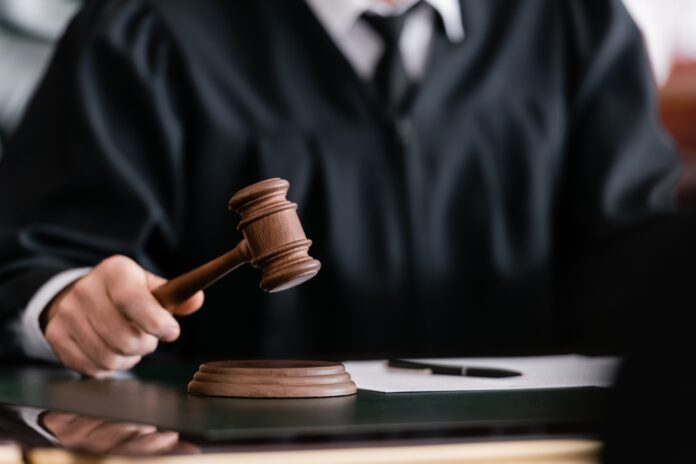The Third Circuit Court of Appeals this week cleared the way for the Disciplinary Board of the Pennsylvania Supreme Court to enforce a statewide rule prohibiting attorneys from engaging in intentional harassment or discrimination due to LGBTQ+ status and other protected categories.
On Aug. 29, a three-judge panel of the appeals court tossed out a challenge to the rule by Zachary S. Greenberg, a Philadelphia-based attorney who claims the rule would infringe upon his free-speech rights.
The panel said Greenberg failed to demonstrate any harm from the rule, thus he doesn’t have legal standing to challenge it. Greenberg has been trying to block the rule since 2021, which is a revised version of a prior rule he successfully challenged.
The rule, known as Rule 8.4(g), hasn’t been enforced during the pendency of Greenberg’s legal challenges.
The three judges who tossed out Greenberg’s most recent challenge are Thomas L. Ambro, Michael A. Chagares and Anthony Scirica. Scirica wrote the 31-page opinion tossing out Greenberg’s lawsuit.
“[Greenberg] fails to establish an imminent future injury because his planned course of conduct is not arguably proscribed by Rule 8.4(g) and he faces no credible threat of prosecution for engaging in such conduct,” Scirica wrote. “To the extent that he asserts standing based on an ongoing chill to his speech, he cannot show that this chill is objectively reasonable or fairly traceable to the challenged Rule.”
Moreover, Scirica wrote, the rule only applies to attorneys who are “practically certain” they’re causing harassment or discrimination, which wouldn’t include Greenberg.
The legal saga began in June 2020, when the state Supreme Court promulgated a rule that would facilitate discipline for attorneys engaged in bias or harassment. The protected categories are: race, sex, gender identity or expression, religion, national origin, ethnicity, disability, age, sexual orientation, marital status and socioeconomic status. Discipline could range from a reprimand to dismissal for the offending attorney.
But in December 2020, after Greenberg filed a challenge, U.S. District Judge Chad F. Kenney said the rule violated attorneys’ free-speech rights.
A revised rule was promulgated by the state Supreme Court in July 2021, which emphasizes that the rule prohibits biased conduct, rather than unpopular speech.
After Kenney struck down the revised rule in March 2022 — on the basis of vagueness and free-speech violations — the Disciplinary Board filed an appeal with the Third Circuit Court of Appeals.
During oral arguments in May 2023, Lisa S. Blatt, an attorney for the Disciplinary Board, told the three-judge panel the rule doesn’t punish attorneys for their opinions.
For example, Blatt said, a racist attorney wouldn’t necessarily be impacted by the rule. But if an attorney intentionally harasses or discriminates against a client on the basis of protected characteristics, the rule would prohibit such conduct, Blatt said.
“You’re not allowed to discipline someone for their opinions,” Blatt told the panel. “It has to do with fitness to practice law.”
But Greenberg’s attorney, Adam E. Schulman, said the rule would have benefited from an amendment to the effect: “Conduct that a reasonable person would consider as petty slights or trivial inconveniences does not rise to the level of harassment under this rule.”
Schulman also said another positive amendment to the rule would have been: “Views on matters of public concern in the context of teaching, public speeches, continuing legal education programs, or other forms of public address, or education are protected.”
Stacey Witalec, a spokeswoman for the Disciplinary Board, said the board had no comment for this story.
“The board has nothing further on this issue,” she said in an email.
Greenberg issued this statement: “The Third Circuit decision leaves a clearly unconstitutional rule on the books because the government promised to not enforce it as written. That’s not how the First Amendment works. Government officials cannot be trusted with the power to censor unpopular speech. Far from protecting minority rights, this decision can itself be turned against pro-LGBT speech that certain states happen to find offensive.”
Kevin M. Levy, president of the Philadelphia LGBTQ Bar Association, expressed agreement with the ruling.
“We are pleased to see the Third Circuit upheld Rule 8.4(g),” Levy told PGN. “This rule will benefit the legal community at large. Importantly, this rule shows that the legal community is serious about weeding out bad and discriminatory actors within our profession while respecting genuine freedom of speech protections for attorneys. Moreover, we have faith the Disciplinary Board will enforce the rule appropriately.”
Schulman, the attorney for Greenberg, said a decision on whether to file an appeal with the full Third Circuit Court of Appeals hadn’t been made, as of presstime.
